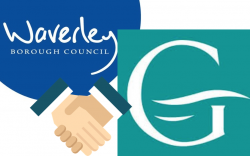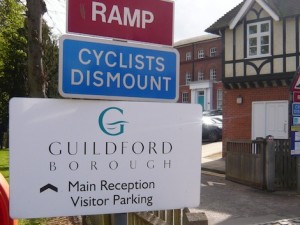 Abraham Lincoln
If given the truth, the people can be depended upon to meet any national crisis...
Abraham Lincoln
If given the truth, the people can be depended upon to meet any national crisis...
 Guildford news...
for Guildford people, brought to you by Guildford reporters - Guildford's own news service
Guildford news...
for Guildford people, brought to you by Guildford reporters - Guildford's own news service
Meet the New Joint CEO Part 2: ‘My Maxim Will Be: No Surprises’
Published on: 3 Apr, 2024
Updated on: 9 Apr, 2024
The new joint chief executive officer for Guildford & Waverley Councils has taken up post at a particularly challenging time, especially for Guildford, where financial management problems have now been added to ongoing Local Plan issues.
Martin Giles meets the new CEO with other local journalists and reports…
See also Part 1: Meet the New Joint CEO: ‘I’m Here To Make Guildford and Waverley Brilliant Places’
Having described his background and aims, Guildford’s new chief Executive Officer was asked to describe his role. He echoes his objective: “My job is to deliver brilliant services for the residents of Guildford and Waverley as it is for every chief executive and in any council, but we do three main things.
The CEO role
“The first thing we do is we support those who are elected [the councillors] in delivering the things for which they have been democratically elected. The most important people within the council are those people that residents have elected them as their representatives. Whoever the majority group is forms the administration, and it is the role of officers to make their vision happen, to the extent that we can.
“[Second] to deliver all the basic things, so you know, streets being cleaned, open spaces being maintained. That’s what officers do. At the same time, we need to provide good robust advice, analysis and challenge to members to make sure that they’re making the right decisions.
“I am accountable to the council as a whole and to all councillors. As a chief executive, I’m politically neutral, I don’t represent any party, and I’m here to deliver for them, regardless of their political persuasion.
“Third, is to be accountable to residents and businesses and to work with partners in order to provide the right services. I think it’s really critical that chief executives don’t just look inwards. I’m not just here to lead officers, I’m also here to use the council’s biggest power, the power to convene. So working with partners and bringing in partners, whoever they may be, to help deliver things for the residents and businesses – I think that is absolutely critical.”
Reputation
I asked him where he thought the reputation of GBC stood in the public’s eye at the moment.
He first jumped to the Housing Revenue Account investigation: “Guildford is going through a relatively well-publicised difficult period with the possibility of fraud in the housing maintenance space. And that’s a particularly difficult thing to deal with because the police are involved. There’s a criminal element to it potentially and that means that what we can say is limited, and also what we know is limited. So that obviously it makes life more difficult.
“An issue like that can’t happen without that plainly being management failings that enable that to happen, because there should be systems in place that prevent that and certainly prevent it from getting to the sort of size that we’re talking about.”
He intends, he said, to introduce an improvement plan to tackle some identified issues but then focussing back on my question added: “Where do I think the the reputations are? I think there is some work to do but I think we’ve got the essence of a really good council here. The residents and businesses ought to be proud of some fantastic work going on. So I hope that some of these issues don’t overshadow the good work that the council has done.”
Admitting that “it’s an arrogant council that doesn’t think that there are areas to improve”, he refers to “a number of issues across the organisation where the kind of controls and systems that I would expect to find aren’t quite where they ought to be.”
Avoiding specifics he executed a neat side-step: “I come back to the themes of the kind of I mentioned before. I want this to be an outward facing kind of council, I think some of the areas of improvement result from some of the external pressures that we are seeing.
“It wasn’t very long ago that the chancellor stood up and set out the future funding plans for for for public services… I reckon we’re looking probably at something like a 3 per cent real cut in local government services.”
And this was happening, he pointed out, while residents endured the cost of living crisis and the costs of council services were also increasing.
“Even if we’re doing things well,” he said, “that doesn’t mean that we can continue doing things in the same way forever. We can’t. And that I think, brings us on to the things like the collaboration…”
 Guildford & Waverley collaboration
Guildford & Waverley collaboration
He was referring to the collaboration between Guildford and Waverley councils who now share a senior officer team and some back-office services.
“…those kinds of innovations are what we absolutely have to do across all local councils… I don’t see any other option for us.”
Asked to explain how he will ensure that he and the other joint officers give Guildford and Waverley Council equal attention, giving their competing priorities, he responds: “I actually see it the other way round. One of the best things about the collaboration is that you have two organisations that can learn from each other.
“I’m using the term ‘collaboration’. I think it’s really important that we’re really clear that’s what it is. We have two separate sovereign councils. I’m conscious that there are different ways of describing it and I think it’s important that we’re clear on this underpinning fact.
“There are some things that Waverly does brilliantly and what I want is for Guildford to learn from that and do that and there are some things that Guildford does really well, that I want Waverley to learn from.”
Finances
Inevitably the conversation returned to the finances. Asked if the risk of the council not balancing the budget and issuing a Section 114 notice, effectively declaring bankruptcy, had been overblown he did not answer directly but said he had started to go through all the finances of both councils with with the chief financial officer but that he hadn’t been through it in sufficient detail to “do that question justice”.
Adding: “I know that a potential Section 114 notice is not a thing that officers do lightly. So that in itself ought to be a message but I think what’s also helpful here is that we have now got to a position, something I’ve been working on with Richard Bates [the CFO], to make sure that we have a sustainable, medium-term financial plan and both councils’ finances are put on a much more normal path.
“What I mean by that is, you know, we will have our 2023/24 accounts signed off by the end of May, they will be audited in June or July, and we are back to a normal kind of cycle. Actually, it’s not all local authorities that can say that, so I think Guilford is now in a really good position.
“But plainly as part of that improvement plan that I mentioned earlier, one of the areas we’ll be looking at, is making sure the financial governance is where it needs to be. ‘No surprises’ is the big sort of maxim I want us to live by.”
“No more £10 million pounds in the wrong spreadsheet column, for example?” another journalist suggests.
“Absolutely not. No.”
Next, in Part 3, Pedro Wrobel expresses his wish to draw a line under the fraud investigation, and gives views on local coffee shops, the Nolan principles and press relations.
Recent Articles
- Guildford Institute’s Crowdfunding Project for Accessible Toilet in its New Community and Wellbeing Centre
- Letter: Guildford – Another Opportunity Missed?
- Letter: GBC’s Corporate Strategy – Where Is the Ambition?
- My Memories of John Mayall at a Ground-breaking Gig in Guildford Nearly Six Decades Ago
- Westborough HMO Plans ‘Losing the Heart of the Street’ Says Resident
- College Invests to Boost Surrey’s Economy and Close Digital Skills Gap
- Community Lottery Brings Big Wins for Local Charities
- GBC Housing Plan Promises ‘A Vibrant Urban Neighbourhood’ Near Town Centre
- Hospital Pillows ‘Shortage’ at the Royal Surrey
- Updated: Caravans Set Up Camp at Ash Manor School


Search in Site
Media Gallery
Dragon Interview: Local Artist Leaves Her Mark At One of England’s Most Historic Buildings
January 21, 2023 / No Comment / Read MoreDragon Interview: Lib Dem Planning Chair: ‘Current Policy Doesn’t Work for Local People’
January 19, 2023 / No Comment / Read MoreA3 Tunnel in Guildford ‘Necessary’ for New Homes, Says Guildford’s MP
January 10, 2023 / No Comment / Read More‘Madness’ for London Road Scheme to Go Ahead Against ‘Huge Opposition’, Says SCC Leader
January 6, 2023 / No Comment / Read MoreCouncillor’s Son Starts Campaign for More Consultation on North Street Plan
December 30, 2022 / No Comment / Read MoreCounty Council Climbs Down Over London Road Works – Further ‘Engagement’ Period Announced
December 14, 2022 / No Comment / Read MoreDragon Interview: GBC Reaction to the Government’s Expected Decision to Relax Housing Targets
December 7, 2022 / No Comment / Read MoreHow Can Our Town Centre Businesses Recover? Watch the Shop Front Debate
May 18, 2020 / No Comment / Read More











Recent Comments